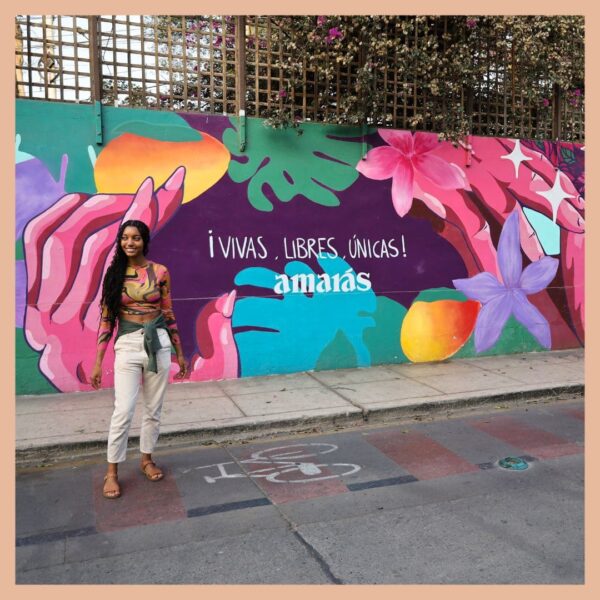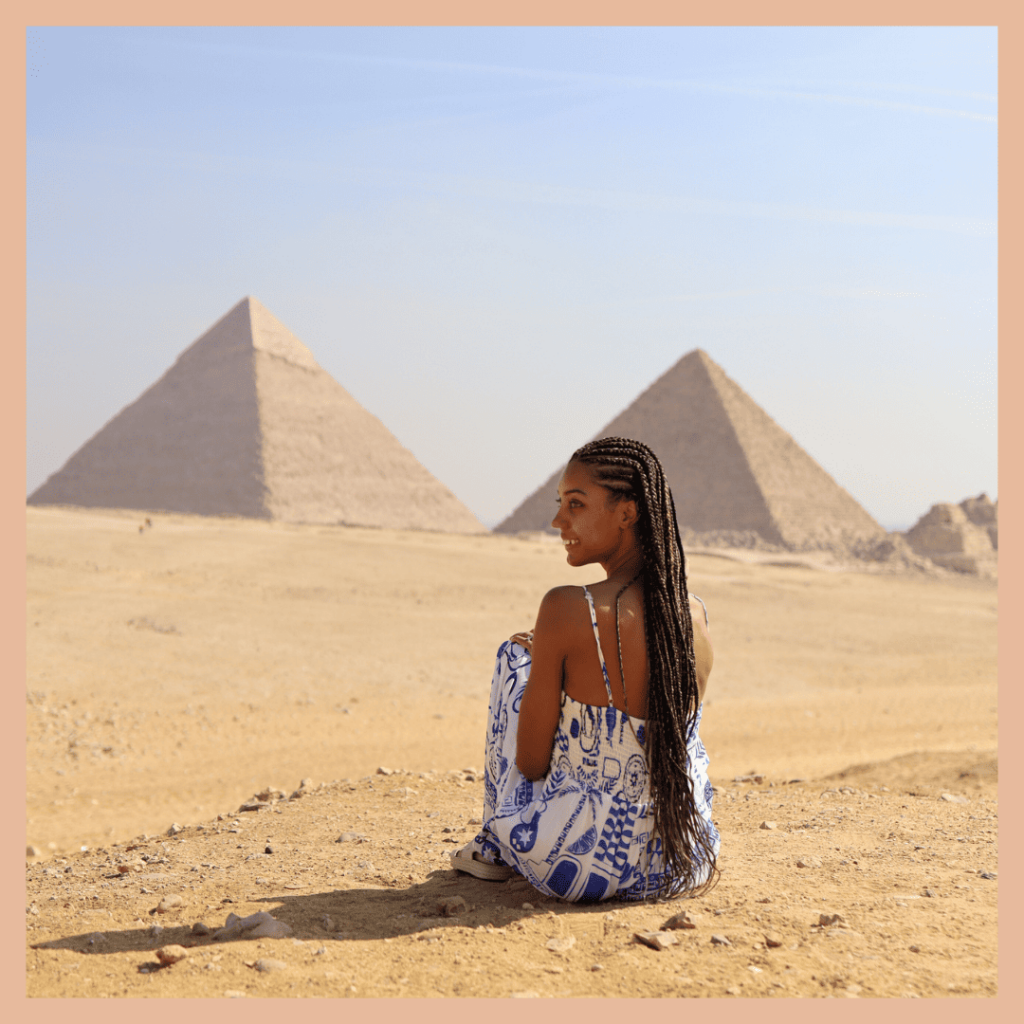
Planning your first trip to Egypt? Whether you’re visiting from the USA or heading there solo, these essential tips for traveling in Egypt will help you navigate transportation, avoid common scams, and make the most of your experience.
Disclosure: This post may contain affiliate links, which means we’ll receive a commission if you purchase through our links, at no extra cost to you. Please read full disclosure for more information.
Egypt is a place unlike any other.
From walking in the shadows of the Pyramids of Giza to wandering through temples where pharaohs once ruled, Egypt feels like stepping into a history book.
However, I’ll be honest—traveling in Egypt can also be incredibly frustrating.
The constant haggling, relentless upselling, and occasional scams made parts of the trip feel more draining than enjoyable.
That said, Egypt is still absolutely worth visiting, as long as you know what to expect and how to navigate the country.
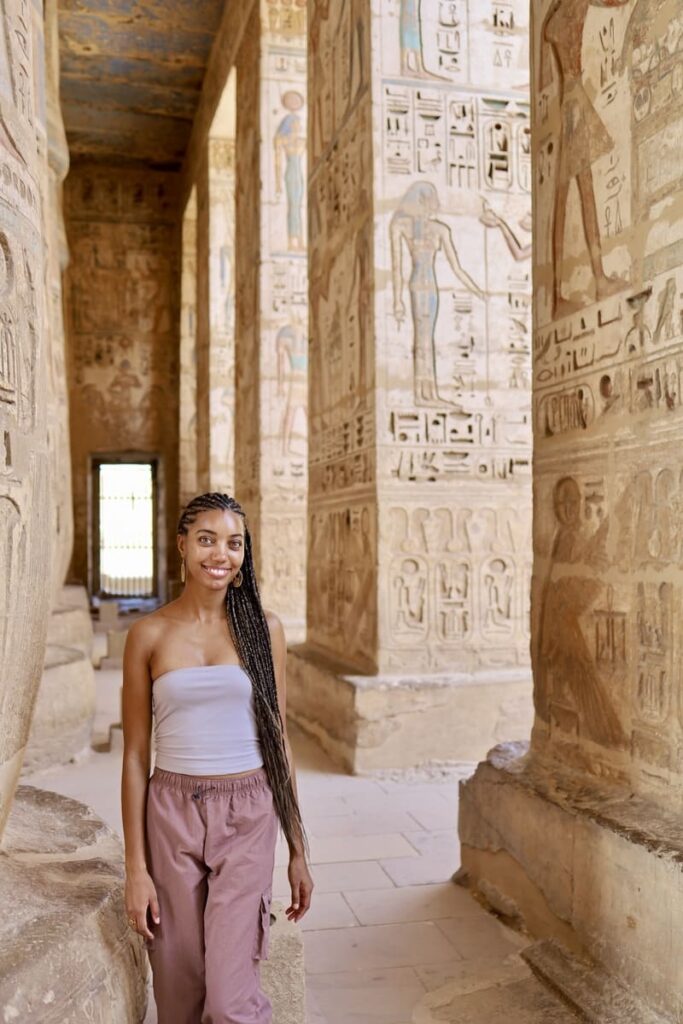
With the right preparation, you can minimize the annoyances and focus on what makes the country so remarkable.
After spending a week traveling through Cairo, Giza, Luxor, Aswan, and the Nubian Village, I’m sharing all the tips I wish I knew beforehand—from transportation and entry requirements to handling the markets and avoiding common tourist traps.
Whether you’re planning your first trip or just looking for ways to make your visit smoother, these tips will help you enjoy Egypt for everything it has to offer.
1. Transportation Tips: Getting Around Egypt
Don’t Rent a Car
Egypt’s traffic is absolute chaos. The road lanes? Purely decorative.
Drivers zigzag between them, creating their own paths constantly.
Honking is their universal language, and flashing headlights is their way of demanding the right of way—whether there’s room or not.
Renting a car here is not just unnecessary but very much unsafe.
Leave the driving to locals who are used to the madness. Instead, stick to rideshares and taxis to get around.
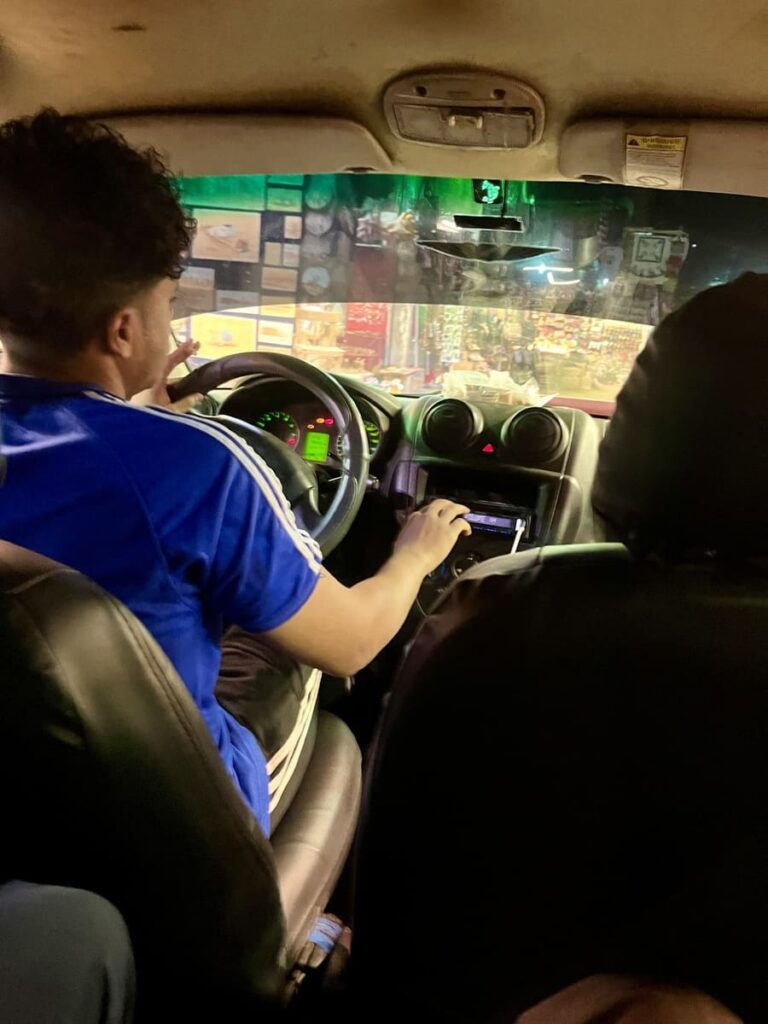
Uber in Cairo
Uber is widely available in Cairo and Giza and is usually the most convenient option.
However, be prepared that drivers can often cancel and message you asking for cash instead of using the app’s payment system.
This happened to us over and over.
For example, if the app quoted 50 EGP (~$1 USD), drivers would cancel and message asking for 500 EGP (~$10 USD) in cash, claiming it was the “standard price.”
It became clear they were bypassing Uber’s pricing altogether to charge whatever they wanted.
Chew Tip: Since many Ubers essentially operate like taxis, keep small bills on you. Even if you negotiate and agree on a cash price beforehand, don’t expect drivers to give you change. They’ll just laugh it off until you get out of the car.
Also, keep Google Maps open during the ride.
Some drivers aren’t familiar with every location and will take wrong turns or get lost—then charge you for the extra time.
To avoid this, direct them yourself to make sure you’re on the right track.
No Uber in Luxor or Aswan
In smaller cities like Luxor and Aswan, your typical rideshare apps like Uber and Lyft don’t exist.
However, you can try the local rideshare app Careem.
Many times, you’ll have to rely on taxis or tuk-tuks, which means negotiating every time.
Here’s what happened to us: We asked one driver how much it would cost to go a short distance. He quoted us a ridiculous price, more than we had paid for any single ride in Egypt.
We walked away and asked another driver, who offered the same ride for 5x less. We ended up hiring him for our entire time in Luxor because he was fair and reliable.
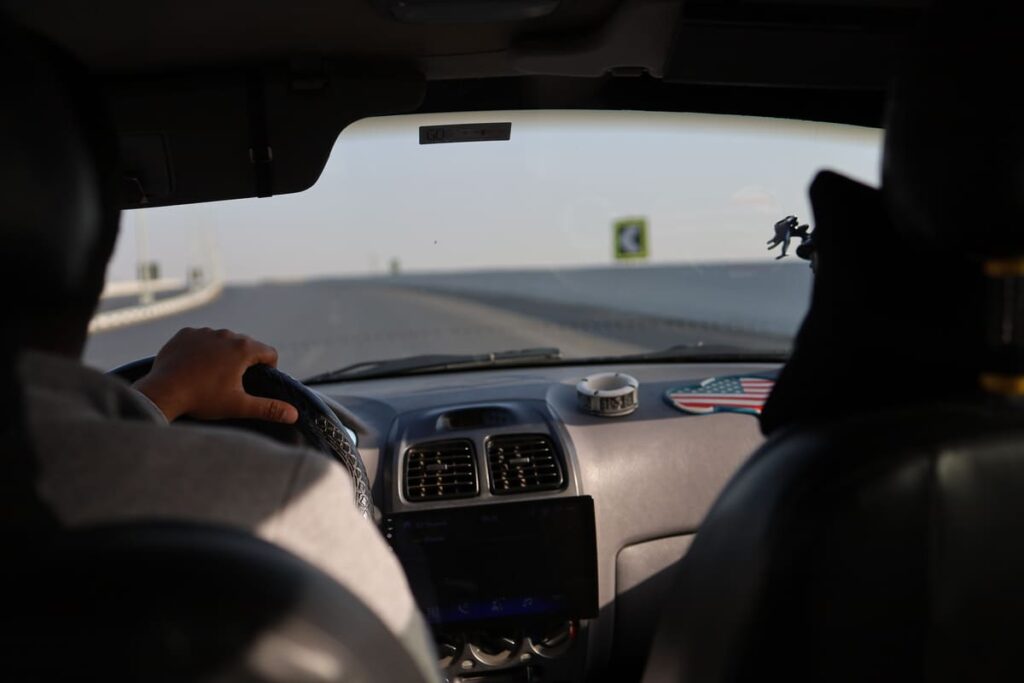
Buses, Trains, and Flights Between Cities
When traveling between cities, you’ll need to decide whether you want to save time or money.
Here’s what you can expect from each option:
Buses
The most cost-effective but time-consuming option.
- Overnight buses from Cairo to Luxor take around 10 hours, while Cairo to Aswan takes about 14 hours.
- It may sound brutal, but taking an overnight bus saves you on both transportation and accommodation for the night.
- We took the overnight bus for ~$7 USD per person and it was surprisingly comfortable—a proper coach bus with reclining seats. I took one melatonin and woke up in Aswan feeling refreshed. It wasn’t bad at all.
Rest Stop Tip:
When the bus makes restroom stops, be prepared for squatty potties—stalls with just a hole in the ground and a bucket of water for flushing. You’ll pay a small fee (~3 EGP or ~$0.06 USD) to use the bathroom.
- Bring small bills to pay the fee and tip the restroom attendant, who may offer you toilet tissue or hand towels.
- It’s also smart to carry your own tissue and hand sanitizer everywhere, as restrooms may lack both.
Flights
The fastest and sometimes surprisingly affordable option.
- We flew from Aswan to Cairo with EgyptAir in about an hour for only $47 USD per person—far quicker and easier than enduring the long bus ride back.
- There are also several budget airlines worth checking out, like Nile Air and Air Cairo, which often have cheap domestic fares.
- If you’re short on time, flying is worth it to maximize your sightseeing hours.

Trains
If you take the train during the day, you’ll get to enjoy scenic views of the Nile River and the surrounding countryside.
However, if you opt for the night train, you won’t see much since it’s obviously dark.
The night train is more about convenience and saving on accommodation than sightseeing.
- Night trains offer sleeper cabins, making them a good way to combine travel with rest.
- However, they take as long as buses but are more expensive (like 8x the price of the bus), which is why we opted for the bus instead.
- Unless you specifically want the train experience, we found buses or flights to be the better value.
RELATED ARTICLE: What Is QSuite on Qatar Airways?
2. Entry Requirements and Airport Tips
Visa on Arrival
For U.S. citizens, you’ll need:
- A valid passport
- A visa on arrival, which costs $25 USD per person (cash only, USD accepted)
- A travel form that you’ll fill out on the plane, asking for basic details like your passport info, accommodation, and flight details
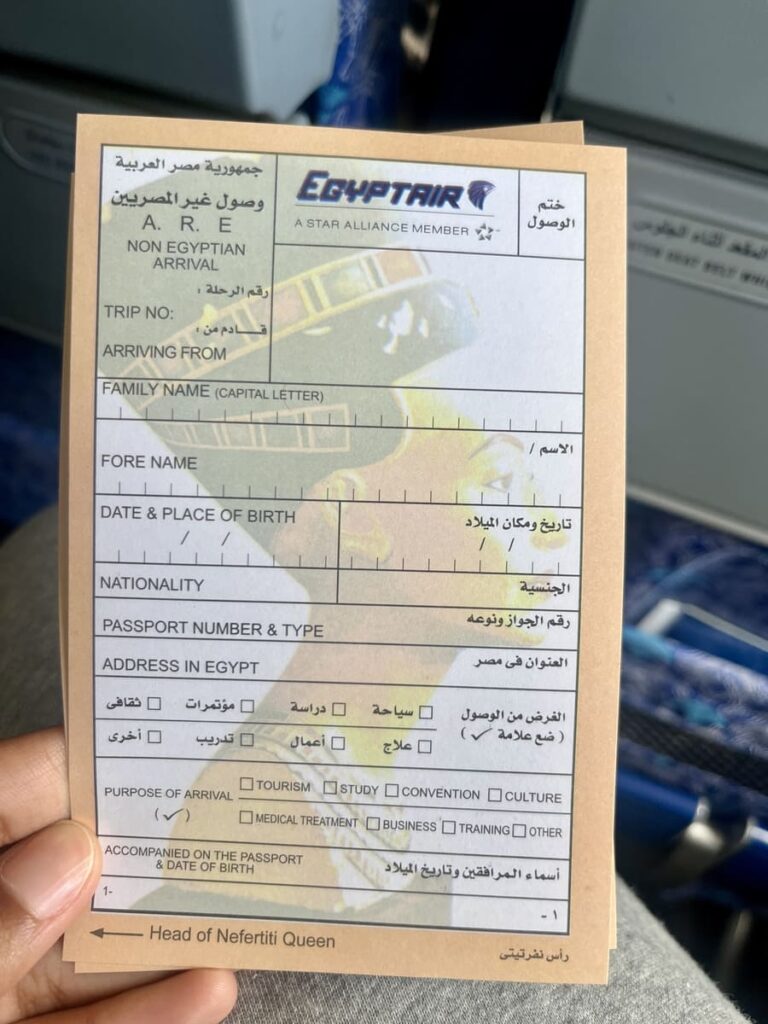
Chew Tip: The visa process is quick and straightforward, but make sure you have exact cash in USD. There aren’t always working ATMs before the visa counter.
Airport Transportation: Watch Out for Taxi Scams
When you leave the airport, drivers will swarm you—especially in Cairo.
Many will falsely claim that Uber isn’t available due to local events, Ramadan, or some made-up regulation. It’s just a tactic to charge you inflated rates in Cairo.
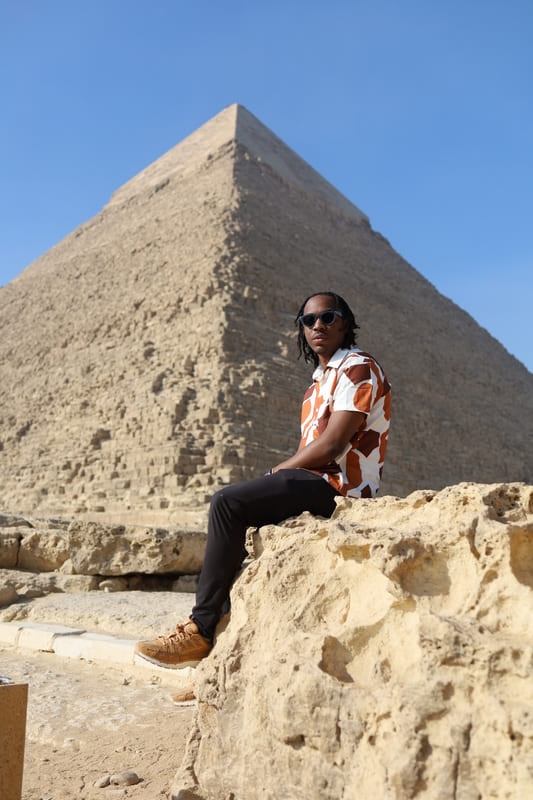
👉🏽 Our experience: When we arrived in Cairo, taxi drivers kept telling us that Uber wasn’t allowed at the airport and that they could offer us a “better deal” since we were now their “friends.”
One guy literally said, “If your friend doesn’t come, I’ll be your second friend. Here’s my name. Here’s my taxi. I’ll wait for you.” 😂
He then kept talking about discounted friend prices, which, of course, were still way higher than what Uber would’ve cost.
Chew Tip: Ignore the drivers and just call an Uber in Cairo. It’s almost always cheaper and can be more reliable. If you don’t want to be hassled, say your friend is coming to pick you up. It won’t fully stop the drivers from talking your ear off, but it might get them to back off a little faster.
If you’re arriving in another city outside of Cairo where Uber is actually not available, you’ll need to have a fair fare price in your head beforehand and then negotiate with a driver to get you outside of the airport.
Security Lines: Gender Separation
At airports like Aswan, security lines are divided by gender. Just pay attention to the signs so you don’t accidentally end up in the wrong line and slow yourself down.
Drones Are Banned
Don’t bring a drone to Egypt. Drones are strictly prohibited, and they’ll confiscate it at the airport if you try to bring one in.
It’s not worth the risk.
There are security checks when you enter almost any building in Egypt – hotels, malls, etc. so if at any point they catch you with a drone in Egypt, that can mean trouble.
RELATED ARTICLE: Ultimate Layover Guide to Doha
3. Best Time to Visit Egypt
The best time to visit Egypt is during the cooler months from November to March.
The weather is far more comfortable, making it ideal for exploring ancient sites and outdoor attractions without battling extreme heat.
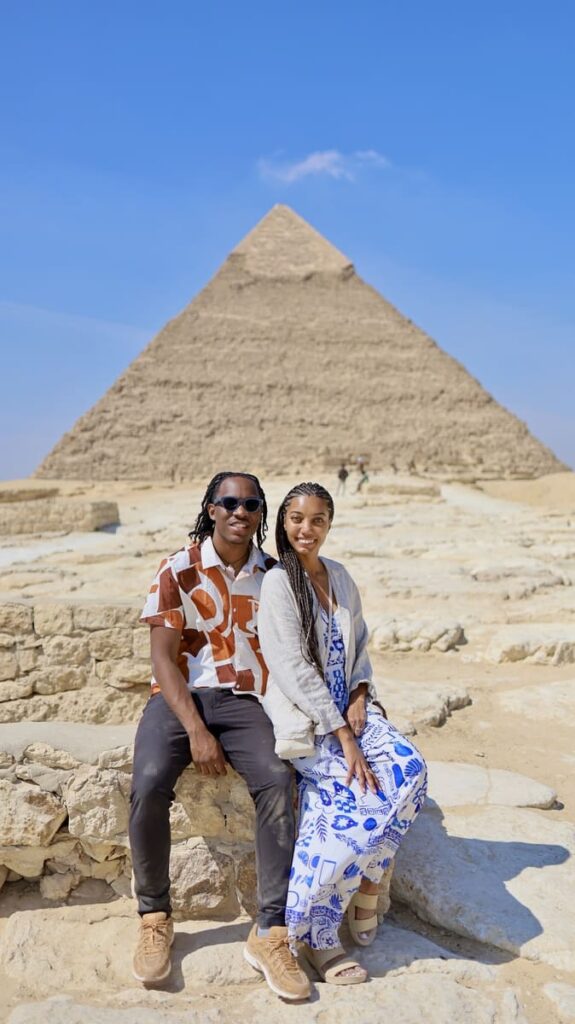
Weather by Region
- Cairo & Giza: Winter mornings can be a bit hazy, which sometimes makes it harder to get clear photos of the pyramids. For the best views, plan your visit for the afternoon, when the haze usually clears.
- Luxor & Aswan: Located in the southern part of Egypt, these areas see little to no rain year-round. Expect dry, sunny days—even in winter—perfect for visiting temples and historic sites.
- Alexandria: Unlike southern Egypt, Alexandria and the northern coast get occasional rain showers during the winter months.
When to Avoid
June through August brings scorching heat, with temperatures often hitting:
- Over 100°F (38°C) in Luxor and Aswan.
- The humidity in Cairo and Alexandria makes the heat feel even more intense.
- Sightseeing in the summer can be brutal, even with frequent breaks.
We visited in early March, and the weather was perfect—warm during the day and comfortably cool at night.
Crowd Tips
- December and January are peak tourist months. Expect larger crowds and higher prices during this time.
- If you want fewer crowds while still enjoying pleasant weather, aim for November or March—just before or after the high season.
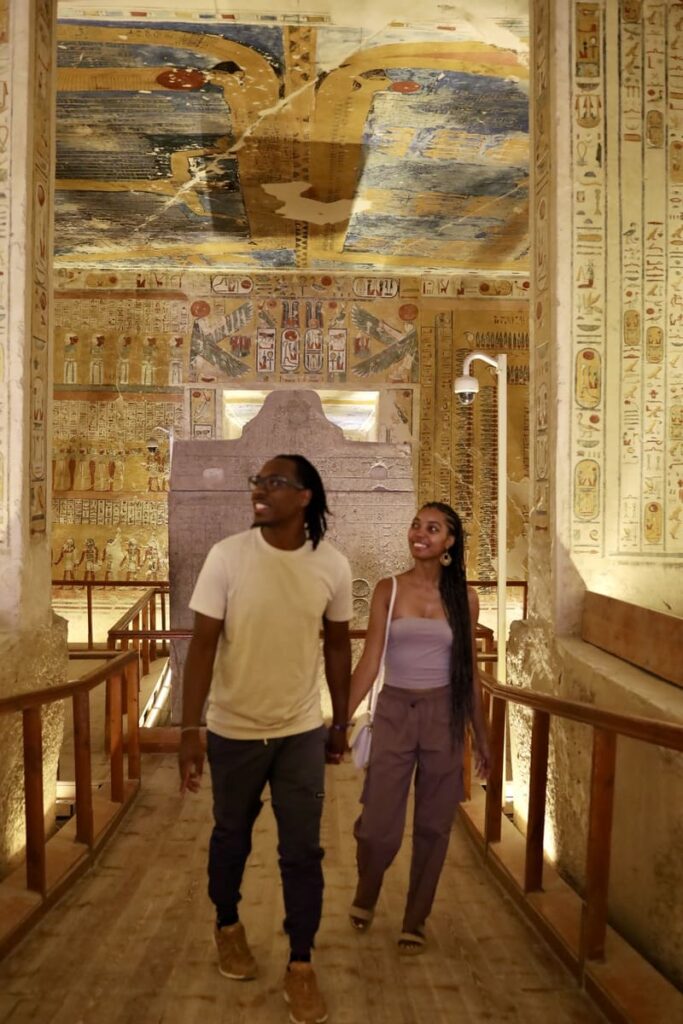
RELATED ARTICLE: Perfect 7-Day Egypt Itinerary
4. Learn a Few Basic Egyptian Phrases
Knowing a few key Arabic phrases makes a big difference, especially with persistent vendor.
The most important phrase?: La shukran = No, thank you. (You’ll use this a lot.)
RELATED ARTICLE: Things to Do on a Long Layover in Qatar
5. How to Handle Market Vendors and Pushy Sellers
Prepare for Relentless Sales Tactics
Egypt’s markets were hands-down the most exhausting parts of the trip.
Vendors don’t take no for an answer.
They’ll block your path, wave items in your face, and even follow you for several blocks trying to make a sale.
We were constantly called:
- “Habibi”
- “My cousin” or “my brother”
- And if you have braids or twists, get ready to hear “nice rasta” every few feet. 😂
It honestly became tiring.
At first, it may seem surprising and funny, but it quickly turned into a constant, overwhelming sales pitch.
RELATED ARTICLE: Why Is Table Mountain So Famous?
Aggressive Upselling Is Common
Upselling in Egypt feels like an Olympic sport. You’ll be pressured to pay extra for things you didn’t ask for or need.
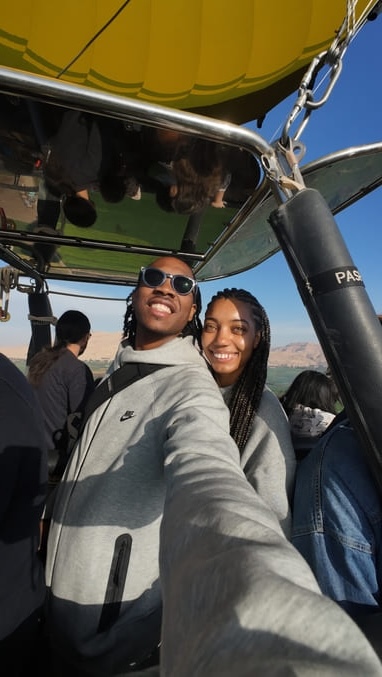
👉🏽 Our experience:
- Hot Air Balloon Ride in Luxor: We booked the second flight (cheaper than the sunrise option, but only one hour later). The night before, we got a message saying:
“Your second flight might be canceled. You should upgrade for $20 USD more per person.” They claimed the weather might cause cancellations for the second flight, and repeatedly asked us to upgrade. We refused to pay extra—and sure enough, our second flight took off just fine. It was clearly a money grab. - Overnight Bus Luggage Scam: When we took an overnight bus, the attendant grabbed our carry-on backpacks without asking and put them under the bus. He then demanded payment for the luggage—even though there was no fee listed and we never asked him to stow the backpacks. We stood firm and refused to pay, while the family in front of us got scammed into paying—only to be told the driver “didn’t have change” and kept their money.
- Restaurant Trick: One time, we sat down for food. The server said: “This is a coffee shop. Two waters okay? No problem, I’ll get them for you.” We didn’t come for drinks since we had our own—we only came for food. But they insisted we needed drinks since it was a “coffee shop.” Even though we didn’t want them, they kept pushing. This is typical in Egypt—they’ll consistently try to upsell or add extra charges, even for things you didn’t ask for.
Chew Tip: You honestly have to get creative with how you say no. “La shukran” (no, thank you) doesn’t always cut it. Sometimes you’ll need to ignore them completely or even act disinterested to stop the sales pitch, which is way worse than any timeshare presentation I’ve ever sat through in my life.
Tips to Avoid Getting Hustled
My husband appreciated the hustle of the Egyptians, but for me, an introvert through and through, the hustle was a bit much.
So here’s my take:
- Don’t make eye contact unless you genuinely want to shop.
- Be firm with your “no.” You’ll have to repeat it multiple times—they are persistent.
- Keep small bills handy. If you hand over a large bill, vendors will claim they don’t have change and pocket the difference.
- Skip random “offers of help.” People will offer directions or assistance and then demand payment. Just wave them off and keep walking.
- Trust your gut. If something feels sketchy, it probably is.
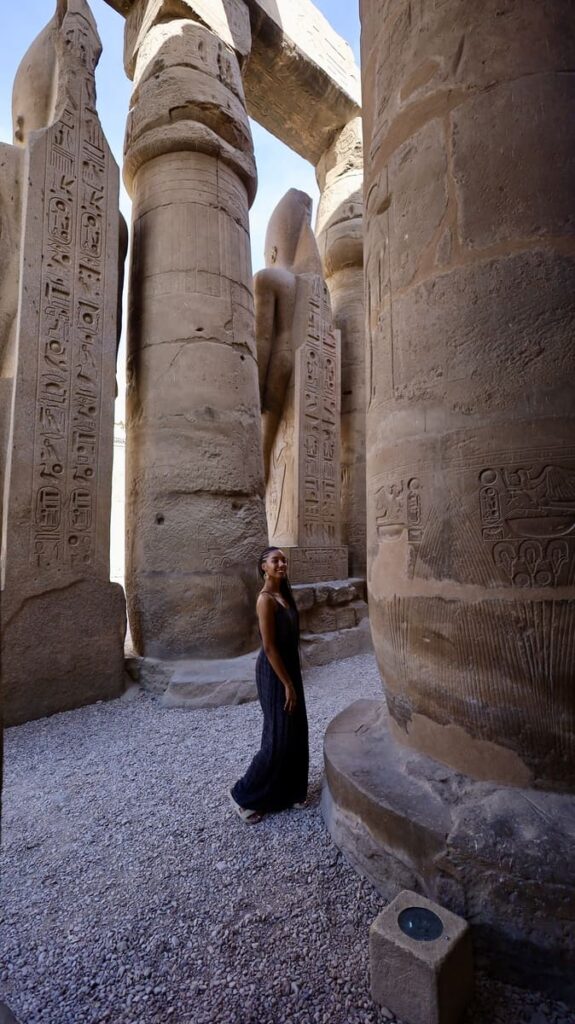
RELATED ARTICLE: Guide to Vacationing in the Seychelles Islands
6. Cash, Cards, and Tipping
Carry Small Bills
Many vendors and taxi drivers claim they don’t have change, insisting you’ll let them keep the difference.
Carry plenty of small bills (10s, 20s, and 50s EGP) to avoid overpaying.
Cash vs. Card
- Cash: Best for small vendors, taxis, tips, and markets.
- Card: Larger sites like the Pyramids of Giza, Grand Egyptian Museum, and major temples only accept card payments for entry tickets.

Tipping Culture
While tipping isn’t required at restaurants, small tips are always expected for services like carrying luggage, giving directions, or taking photos.
While you’re visiting different attractions like Karnak Temple or tombs in the Valley of the Kings, local security guards may call you over to show you additional locked temples and passageways.
Just know they’re never showing you just to show you. It’s for a tip for themselves and any other local guard they called over to also show you around.
Simply don’t follow them, or have your tips ready.
RELATED ARTICLE: Stress-Free Vacation Tips
7. Accommodation Tips: Where to Stay
While in Egypt, we stayed in Cairo, Luxor, and the Nubian Village in Aswan.
Here’s what we learned firsthand—and what you should know if you’re visiting other parts of the country.
Skip the Cheap “Pyramid View” Hotels in Cairo
In Cairo, we fell for the “pyramid view hotel” trap—and it was a disaster.
Here’s what happened:
- The hotel’s listed address was just a street name—no building number. Our taxi driver dropped us off in the middle of nowhere, and hotel staff had to find us and then walk us 10 minutes through chaotic streets and up 10 flights of stairs.
- When we finally got to the hotel, they claimed they couldn’t find our reservation and tried to charge us extra for the “pyramid view”—even though we had already booked a room with that view.
- The hotel was unfinished and the room itself was filthy—the showerhead broke off the wall, and the sheets were stained. We checked out immediately. Expeditiously!
To make matters worse, it took over an hour to process our refund.
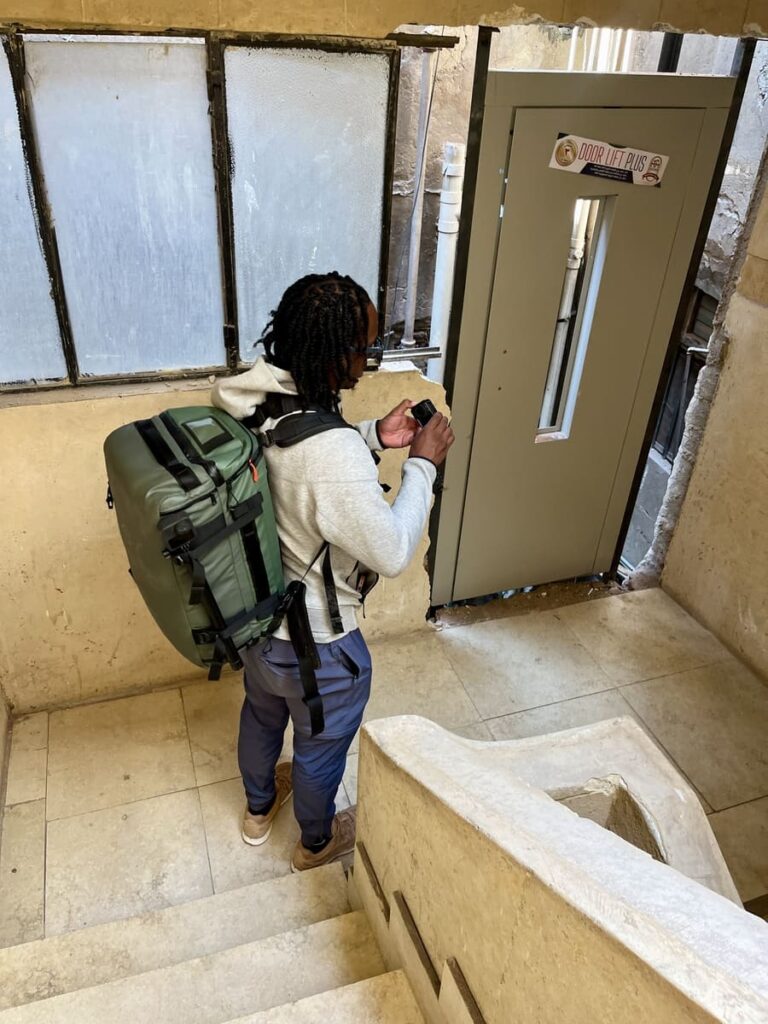
Lesson learned:
- Skip the cheap pyramid-view hotels. They’re often sketchy, misleading, and poorly maintained with fake reviews.
- If you want the view, spend the money on reputable hotels like the Marriott Mena House or the Steigenberger Pyramids Cairo. These places have real addresses, reliable service, and actual cleanliness standards.
- Alternatively, consider Airbnb, where you can clearly communicate with your host through the app and can expect more trusted reviews. We booked a last-minute one in Cairo and had a much better experience—cleaner, safer, and no scams.
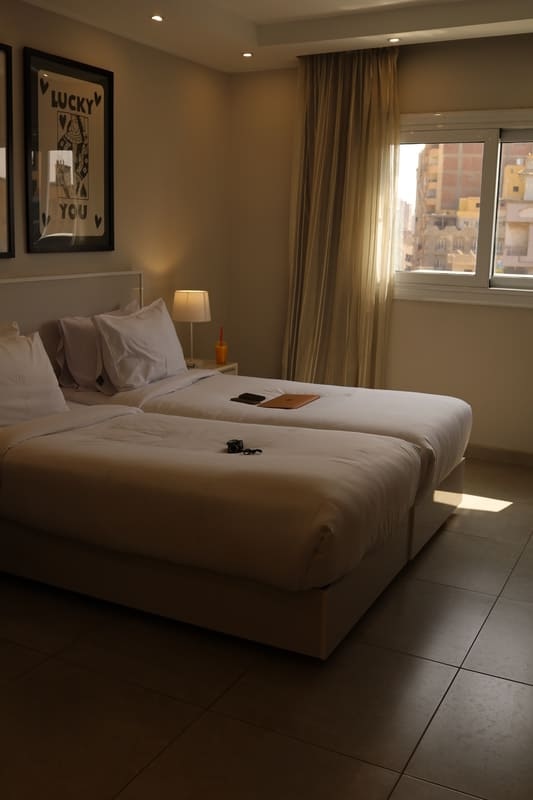
RELATED ARTICLE: Must-Know Pros and Cons of Airbnb vs Hotel
Luxor: Hilton Luxor Resort Is Worth It
In Luxor, we stayed at the Hilton Luxor Resort & Spa, and it made a huge difference in our experience.
- The resort was clean, reliable, and peaceful—which felt like a blessing after the chaos of Cairo.
- It had comfortable amenities, friendly staff, and a great location near major sites.
Chew Tip: Many things in Egypt are cheap. Go ahead and splurge on your accommodation. Staying in a Hilton was worth it for the comfort and reliability. We used our Hilton Honors points to book the stay to fit our budget.
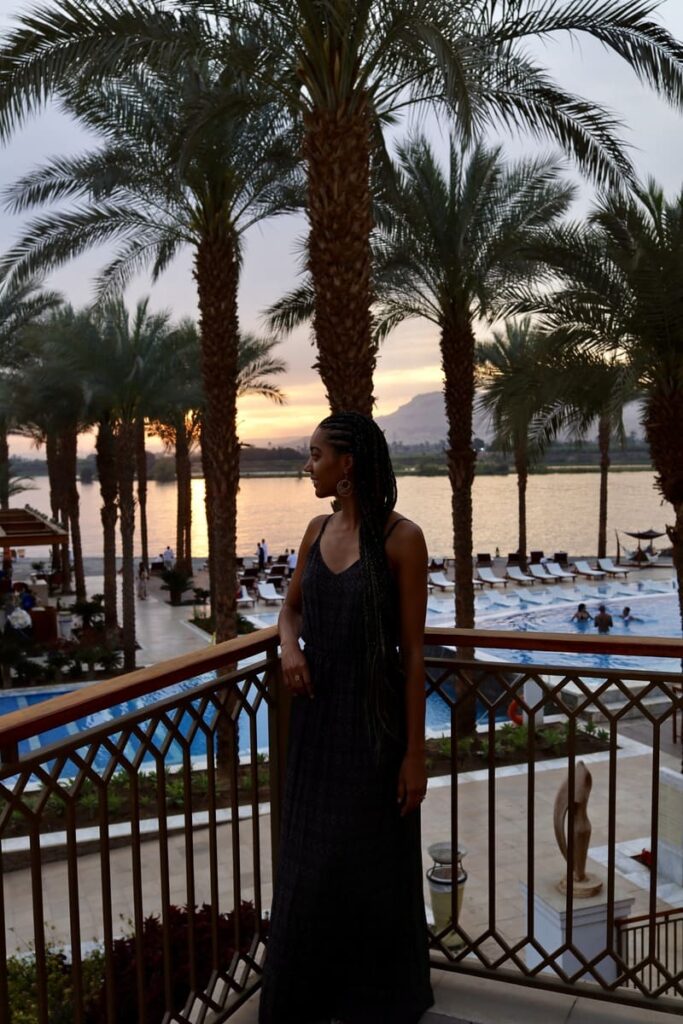
Nubian Village in Aswan: Stay for the Experience
If you visit Aswan, consider staying in the Nubian Village. It was one of the highlights of our Egypt accommodations.
- The locals were genuinely kind and welcoming.
- The village itself is colorful, vibrant, and far more laid-back, making it a great place to unwind.
- While the vendors still sell their goods enthusiastically, they were less aggressive than in the larger cities.
Travel Tips for Aswan:
- The guesthouses in the Nubian Village offer an authentic, culturally rich experience, often with homemade Nubian meals.
- Even if you’re staying elsewhere in Aswan, consider booking a night or two in the Nubian Village.
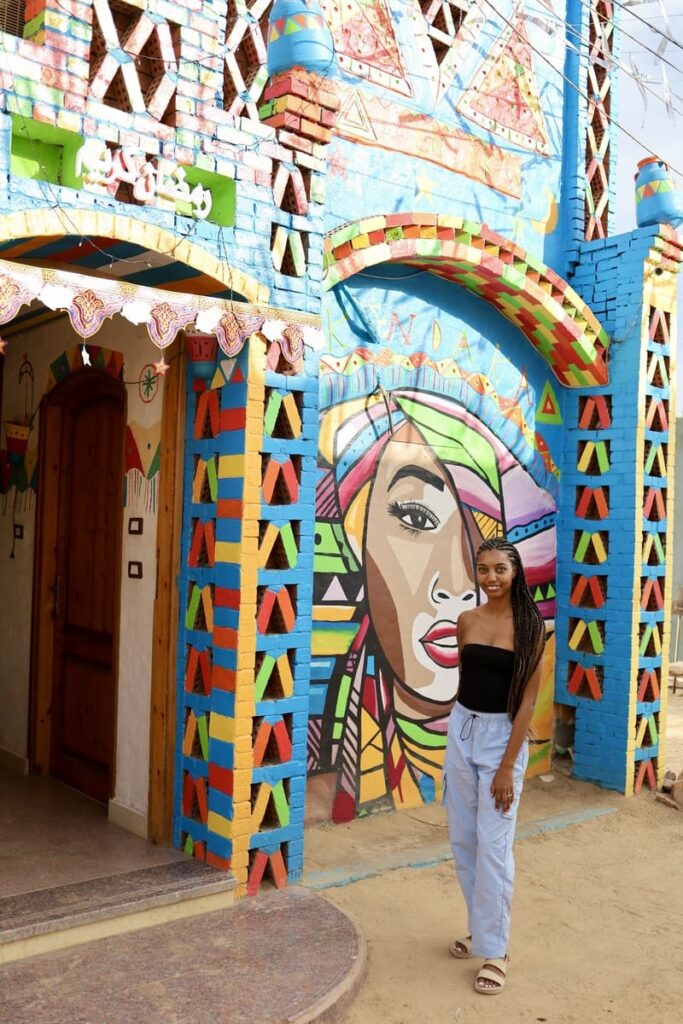
RELATED ARTICLE: Cape Town Travel Tips
If You’re Visiting Other Parts of Egypt
While we only stayed in Cairo, Luxor, and Aswan, if you’re heading elsewhere, keep these general tips in mind:
- Red Sea Resorts: If you’re visiting Hurghada or Sharm El Sheikh, consider all-inclusive resorts. These areas are known for beach getaways, and resorts often offer the best value with meals and activities included.
- Desert Stays: In areas like Siwa Oasis or the White Desert, you’ll find eco-lodges and desert camps. These are perfect for unique, off-the-grid experiences, but make sure to research reviews—some camps have very basic amenities.
- Alexandria: If you’re heading to the coastal city, you’ll find mid-range hotels and budget-friendly guesthouses. Alexandria is less touristy than Cairo, making accommodation prices more reasonable.
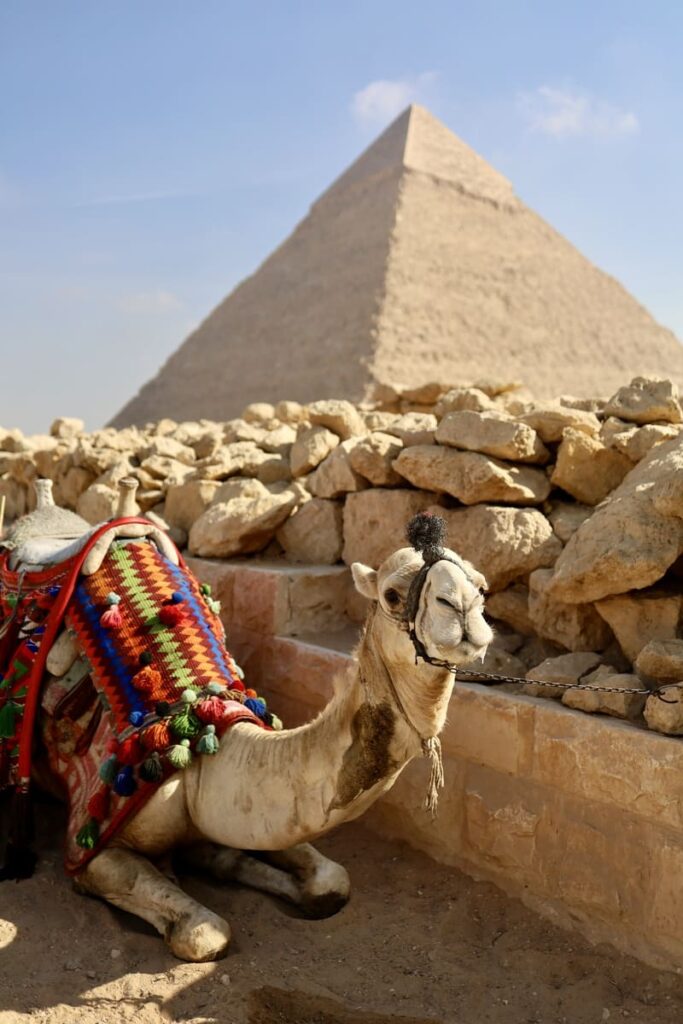
RELATED ARTICLE: What Is There to Do at Waldorf Astoria Platte Island?
8. What to Eat in Egypt
Egyptian cuisine is flavorful, hearty, and diverse, with plenty of vegetarian options and rich, slow-cooked dishes.
Here are the must-try foods we personally enjoyed—and a few drinks you shouldn’t miss.
Must-Try Egyptian Food
Koshari: Egypt’s national dish and a must-try. It’s a comforting carb overload of lentils, rice, pasta, and chickpeas, topped with a spiced tomato sauce, fried onions, and garlic vinegar. It’s cheap, filling, and full of flavor.
Falafel (Ta’ameya): Unlike the chickpea falafel you might be used to, Egyptian falafel is made with fava beans, giving it a softer, creamier texture. Often served with tahini sauce or stuffed in Egyptian bread with salad.
Foul (Fava Bean Stew): A simple but delicious dish made of slow-cooked fava beans, seasoned with garlic, lemon, and cumin. It’s usually served for breakfast with Egyptian bread.
- Vegetarian-friendly and super filling.
Tagine: These slow-cooked clay pot dishes are full of flavor. You’ll find a variety of options:
- Potato tagine (my personal favorite): Tender potatoes stewed with tomatoes, garlic, and spices—perfectly comforting.
- Chicken and fish tagines: My husband loved these—the chicken was juicy and well-seasoned, while the fish had a rich, tangy tomato-based sauce.
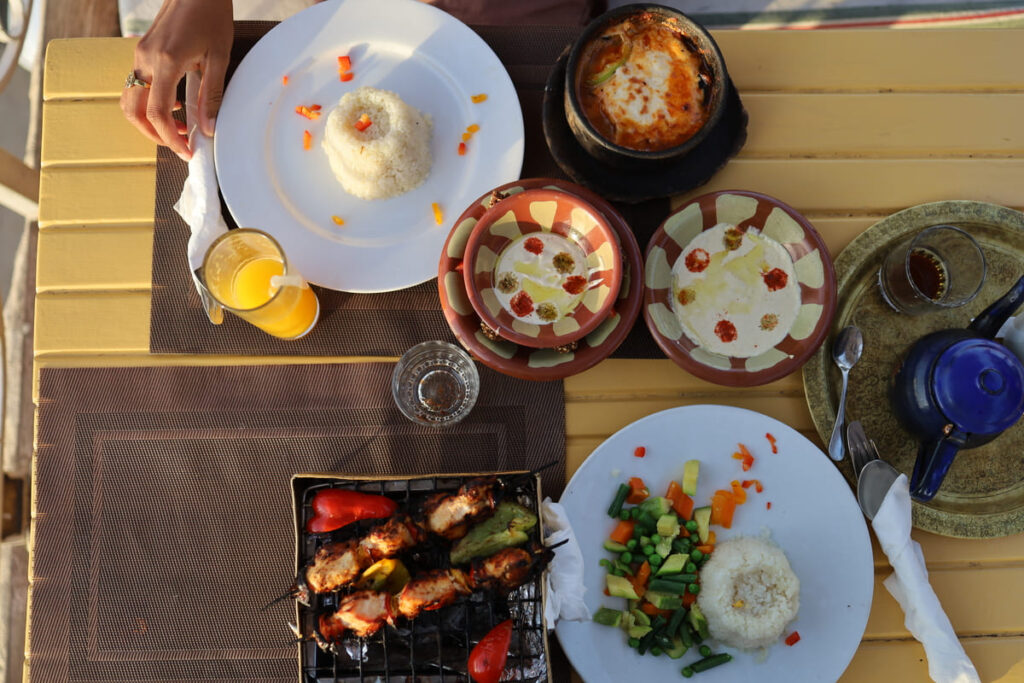
Bentengan with Felfel: A flavorful dish of eggplant and peppers, slow-cooked with garlic, tomato, and spices. It’s vegetarian-friendly and packed with bold flavors.
Feteer Meshaltet: A flaky, buttery pastry often served with either savory or sweet fillings. Think of it as an Egyptian pizza.
Lentil Soup: Warm, spiced, and comforting—Egyptian lentil soup is often flavored with cumin, garlic, and lemon, giving it a slight kick.
Hummus: While not unique to Egypt, it’s a staple at nearly every meal. Creamy, garlicky, and perfect for dipping with fresh Egyptian bread or veggies.
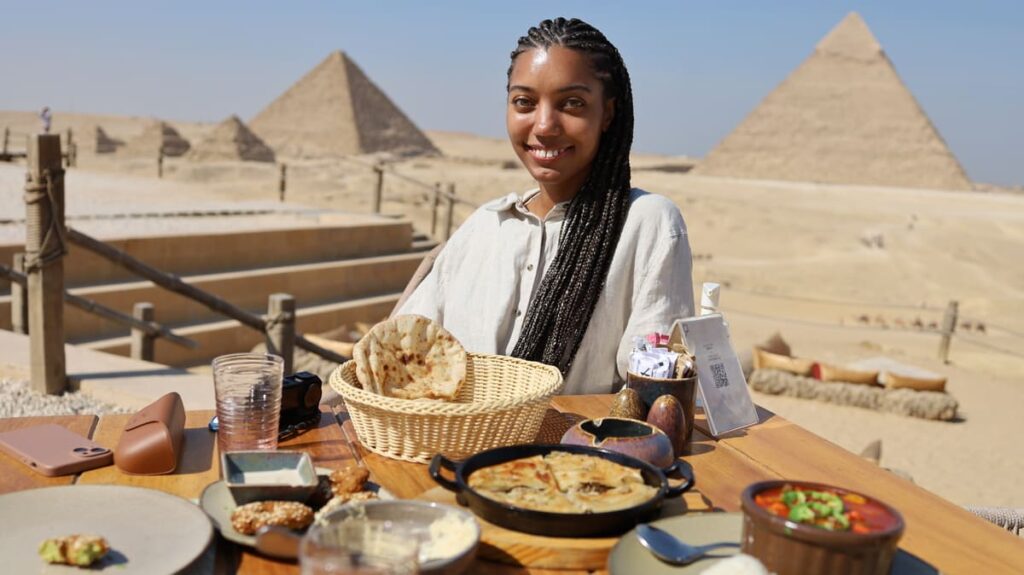
Must-Try Egyptian Drinks
Before you dive into Egypt’s delicious drinks, remember that tap water isn’t safe to drink.
Always stick to bottled water—even for brushing your teeth—and avoid ice in drinks unless you’re sure it was made with purified water.
Many restaurants and hotels serve filtered water, but it’s best to ask if you’re unsure.
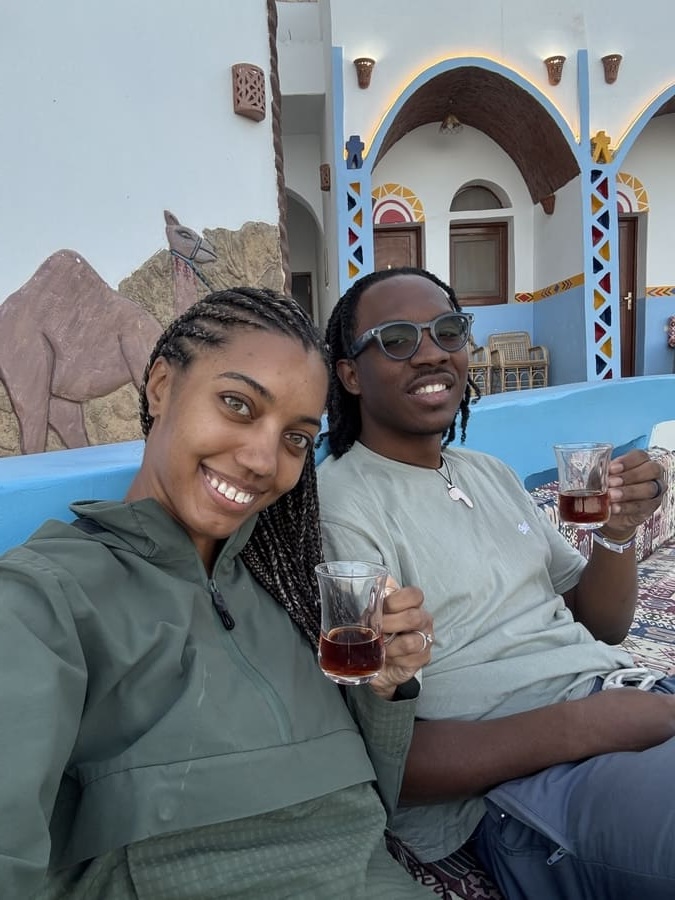
Hibiscus Tea (Karkadeh): A tangy, ruby-red tea made from dried hibiscus flowers. It’s slightly sweet and tart, served hot or cold.
- Nubian hospitality: In the Nubian Village, we were greeted with hibiscus tea in almost every home and hotel.
Fresh Orange Juice: Street vendors sell freshly squeezed orange juice all over Egypt. It’s refreshing, sweet, and super cheap.
Sugar Cane Juice (Asab): A local favorite made from pressed sugar cane stalks. It’s super sweet and refreshing, perfect for a hot day.
RELATED ARTICLE: Best Mahe Itinerary
9. How to Visit Egypt’s Top Attractions
Seeing Egypt’s ancient wonders is unforgettable—but navigating the logistics can be tricky.
Here’s how we visited the main sites, along with tips to help you avoid the mistakes we made and save time and money.
Essential Tips Before You Go
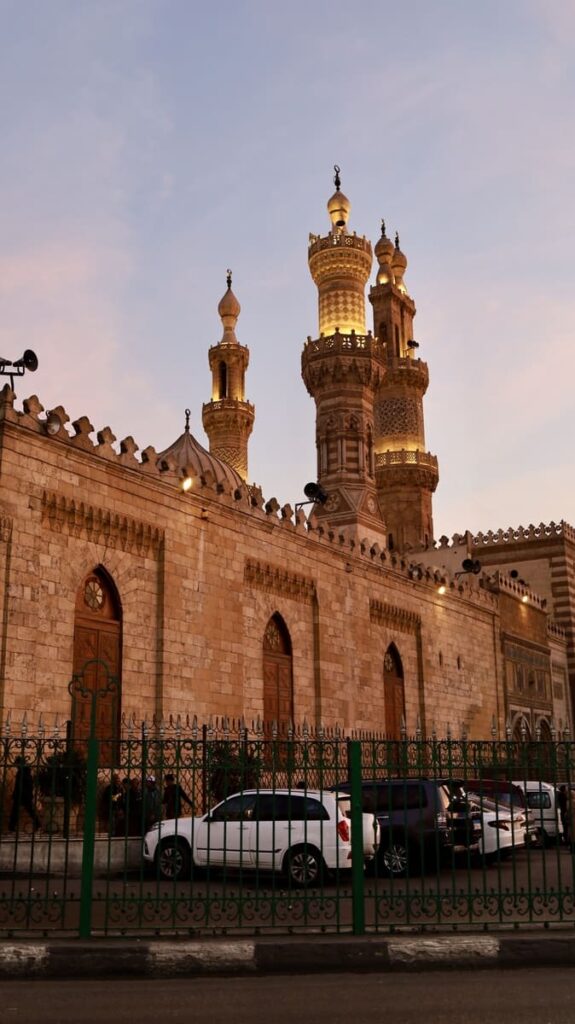
- Mosque Etiquette: If you’re visiting mosques, you’ll need to:
- Remove your shoes before entering.
- Dress modestly: Both men and women should cover their arms and legs. Women will also need to wear a headscarf.
- Remove your shoes before entering.
- Respect the Sites: Avoid touching artifacts or structures at historical sites. If you’re taking photos or videos, make sure to turn off your flash to prevent damage.
- Bring a Student ID: If you’re a student, bring your physical ID card. Many attractions offer discounted entry fees with valid student IDs. Digital copies typically won’t cut it—most places insist on seeing the physical card.
Great Pyramids of Giza
Go to Pyramid 9 Lounge First
If you want stunning pyramid views while you eat, Pyramid 9 Lounge is the place to go.
It’s a restaurant inside the pyramid complex but not walkable from the main site—you’ll need a driver to get there.
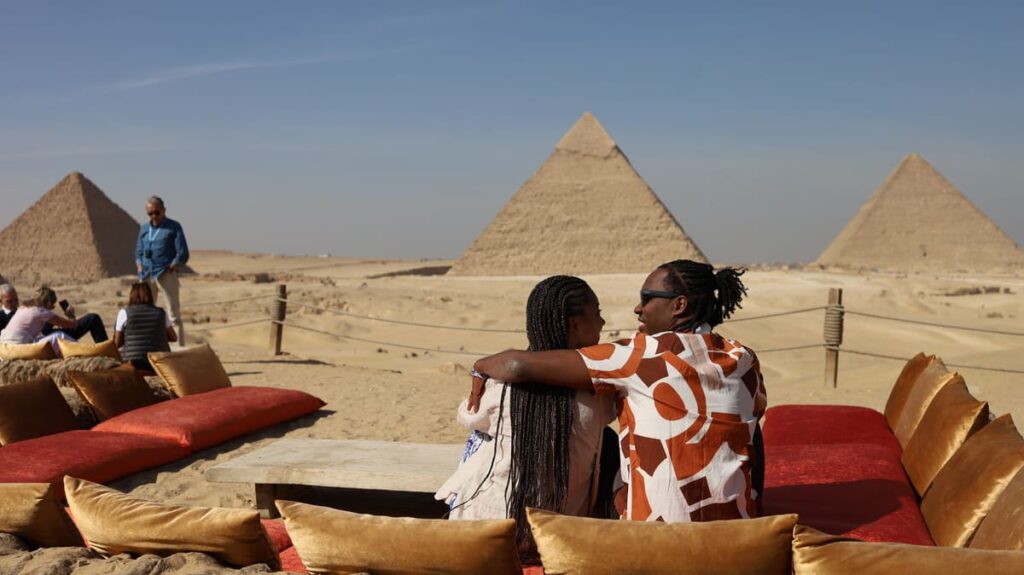
❗ Important Entry Tip:
We originally visited the pyramids first and planned to go eat at Pyramid 9 Lounge afterward. Since it’s technically within the complex but not accessible on foot, we had to exit and get a driver. When we tried to re-enter with our original tickets, security claimed our tickets would not scan again, even though they were technically valid for the day. We had to buy new tickets for ourselves, on top of paying for a local driver ticket and a car ticket (which we already expected).
Here’s What We Recommend Instead:
- Go to Pyramid 9 Lounge first for a meal. (This requires paying for a tourist entry ticket for yourself, a local entry ticket for your driver, and a vehicle ticket for your driver’s car).
- Then, have your driver drop you off still inside the complex to explore the pyramids afterward. (This way, you avoid paying for multiple entries into the complex, like we did).
Camera Rules & Bribery:
Egypt’s camera rules are wildly inconsistent. When we first visited the pyramids, security had no problem with us bringing in a camera.
But when we returned later to the pyramids, the same guard suddenly claimed we couldn’t bring it in. She even held onto the camera and hinted that we’d need to pay her to get it back.
Chew Tip: Keep small bills on you. When they make up rules on the spot like this, give them as little as possible and say it’s all you have.
Abu Simbel
Skip the Tours—Hire a Private Driver Instead
Abu Simbel is absolutely worth the trip, but joining a standard group tour (like we did) meant squeezing through massive crowds.
It felt rushed and crowded, making it harder to enjoy.
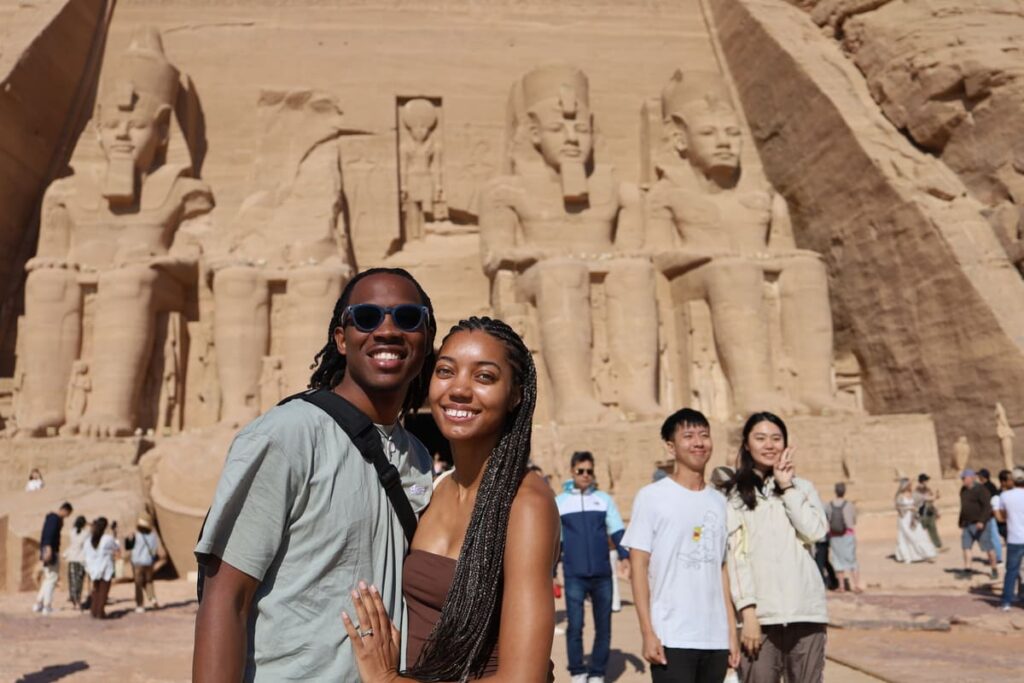
Here’s What We Wish We Did:
- Hire a private driver and go outside of standard tour group times.
- You’ll arrive before or after the tour bus rush, making the experience far more enjoyable.
- More cost-effective: If you’re traveling with friends or a small group, you can split the driver cost, making it cheaper than joining a tour bus.
Getting There:
- From Aswan, the drive takes around 3 hours each way.
- Chew Tip: Bring snacks and water for the long ride.
Philae Temple
Share a Boat with Other Travelers
The only way to reach Philae Temple is by taking a boat across to Philae Island.
If you book a private tour, the boat ride is typically included.
However, if you visit independently (like we did), you’ll need to rent a boat yourself.
Here’s How to Save Money:
If you’re solo or a couple, the boat operators will try to charge you for the entire boat—which can be expensive.
Instead:
- Find other independent travelers (not private tour groups) and share the boat to split the cost.
- Our Experience: We spotted a few solo travelers and asked if they wanted to split the boat ride, which saved us all money.
Payment Tips:
- The entry ticket for Philae Temple is card only.
- The boat ride is cash only, so bring small bills.
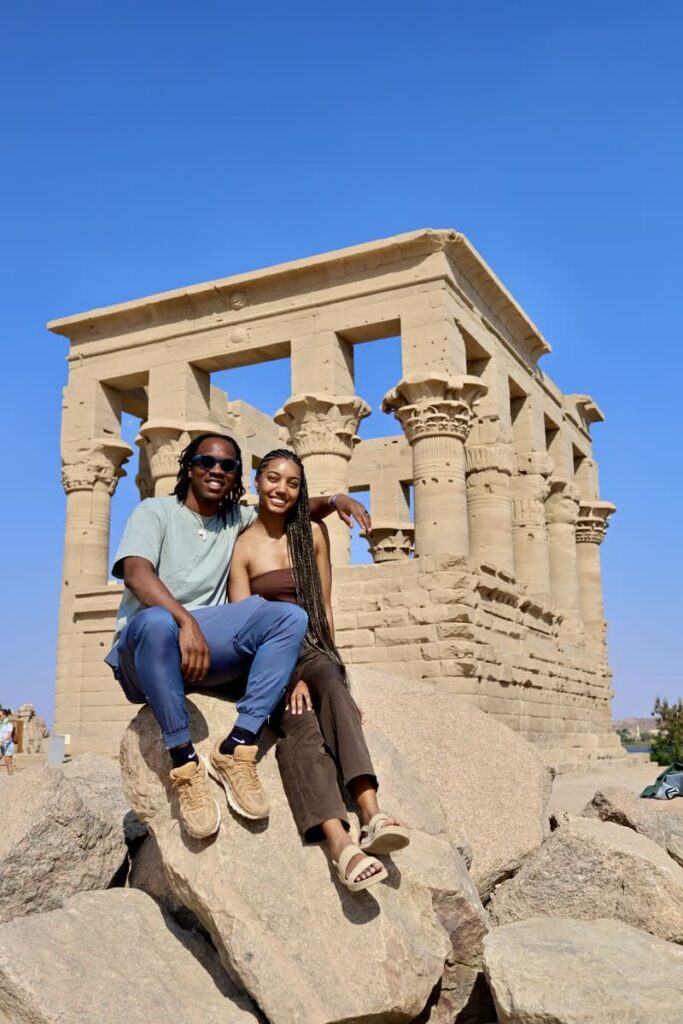
Karnak Temple vs. Luxor Temple
Go to Both!
These two iconic temples in Luxor are equally worth visiting—but they offer different experiences.
- Karnak Temple: The larger and more impressive of the two, with massive columns, towering obelisks, and sprawling ruins. You’ll need a couple of hours to explore it fully.
- Luxor Temple: Smaller but still beautiful, with well-preserved carvings and statues. It’s especially magical at night when the temple is illuminated.
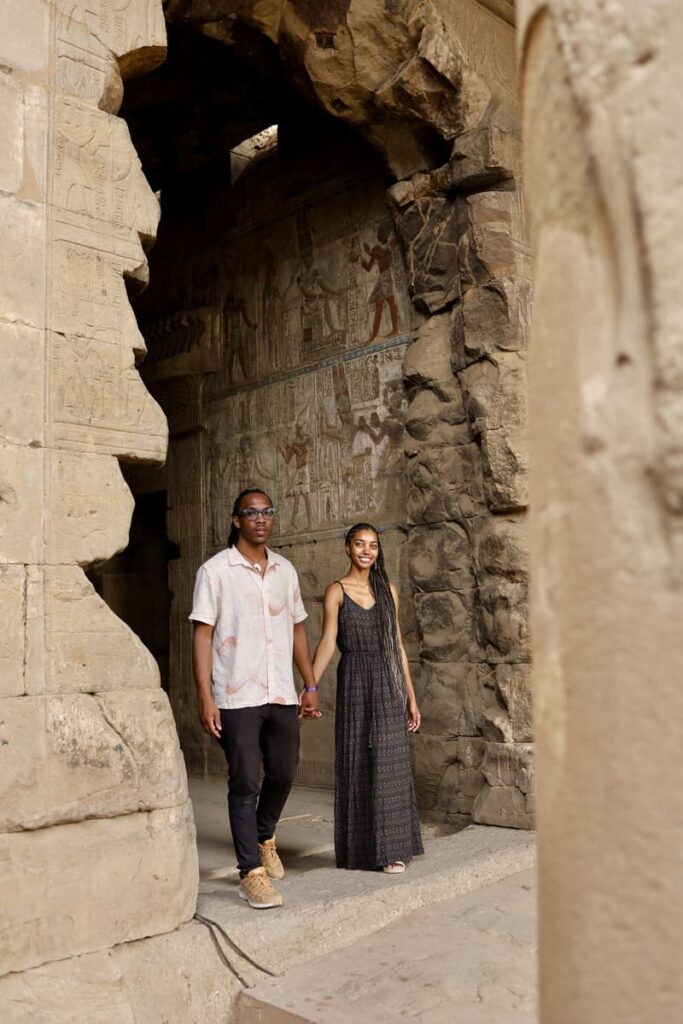
Our Recommendation: If you’re short on time, Karnak is the more impressive of the two. But if you can swing it, visit both.
RELATED ARTICLE: Best La Digue Itinerary
10. Where to Buy Souvenirs
If you’re planning to shop for souvenirs, I highly recommend skipping the Cairo markets (souqs) like Khan el-Khalili altogether.
Instead, head to the Nubian Village in Aswan, where the vendors are friendlier, less pushy (still pushy), and genuinely welcoming.
They offered us products without being too overbearing.
You could take your time browsing without feeling cornered or pressured. We found authentic crafts, beautiful jewelry, and oils at reasonable prices in the Nubian Village.
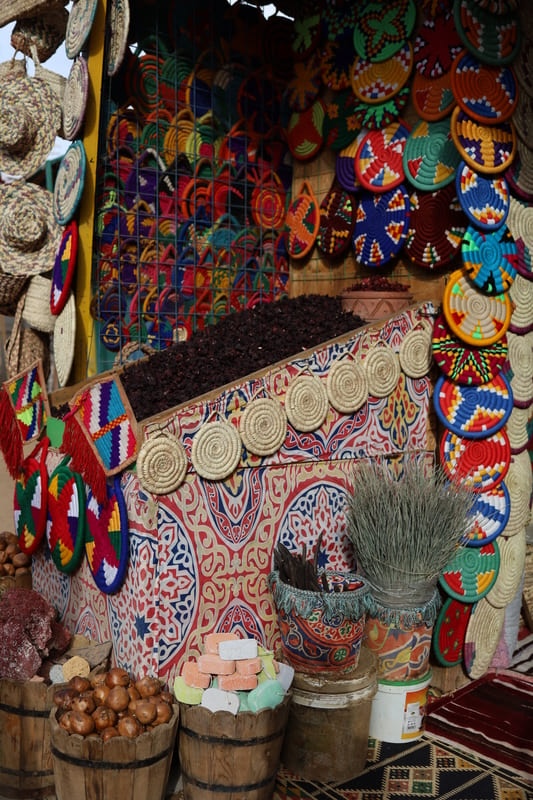
Why We Say Skip the Cairo Markets
We initially had a good experience shopping in Khan El-Khalili when we bought traditional outfits for around $6 USD each. It felt like a fair and pleasant exchange.
But the moment another merchant saw us make a purchase, things quickly went downhill.
- He insisted on giving us his business card and asked us to just take a look at his shop.
- We politely declined, but he kept leading us through the market until we ended up in his shop.
- Once inside, he positioned himself by the door, while we were seated on a couch away from the exit—making us feel trapped.
The Hard Sell Experience:
The merchant offered us perfume oils, which admittedly smelled amazing, but we hadn’t come for that.
Plus, I already had some Egyptian oils at home from when my friend brought some back for us when she first visited.
- The merchant wanted us to buy two bottles for $160 USD, which was way out of our budget.
- We repeatedly declined, but he kept asking, “What’s your price?”, trying to negotiate.
- We didn’t want to insult him with a low offer since we knew the oils were high quality, but we also didn’t want to spend more than $30 USD.
- Despite saying no at least a dozen times, he started pouring oils into smaller bottles, taping them, wrapping them, and even placing them into our bags—essentially forcing the sale.
- Feeling pressured, we ended up buying one small bottle for $40 USD, even though we had only intended to spend the $12 USD total on the traditional outfits we purchased.
We left feeling dissatisfied and frustrated.
The aggressive sales tactics took away a lot of our time and made us not want to shop anywhere else in Cairo or recommend Khan el-Khalili to anyone.
But, the choice is ultimately yours. Many say this is a must-visit in Old Cairo.
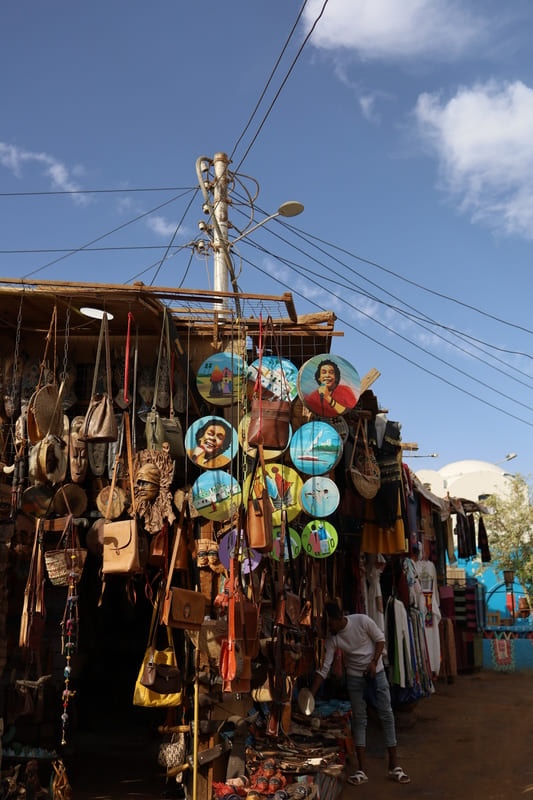
RELATED ARTICLE: What to Do on Mahe Island, Seychelles?
11. Safety Tips
Overall Safety
We never felt physically unsafe in Egypt, but the constant pestering from vendors was mentally draining.
You’ll also see military personnel on the streets, which is common and nothing to be alarmed about—it’s just part of the security presence.
Transportation Safety
- Driving Is the Riskiest Part: Egyptian roads are chaotic—cars swerve unpredictably, and traffic laws are rarely followed. Always wear your seatbelt, even if the driver isn’t.
- Taxis and Rideshares: Only get into a taxi or Uber with the driver—never accept rides from anyone else who hops in.
Staying Connected
We used HolaFly eSIM to stay connected throughout Egypt. It was a budget-friendly and hassle-free option.
Chew Tip: Buy and install your HolaFly eSIM before your trip and activate it once you arrive in Egypt. This way, you’ll have immediate data access for navigation, translation, and ride-hailing apps without scrambling for a local SIM card.
Tips for Solo Female Travelers
While I didn’t travel solo, I want to include important safety tips for women traveling alone based on what we observed and learned:
- Stick to Crowded Areas: If you feel uncomfortable, move toward families, women, and children. It’s safer to stay around larger groups.
- Be Cautious in Isolated Spots: Avoid walking through quiet alleyways, dark streets, or empty areas, especially at night.
- Metro Safety: In Cairo, use the women-only metro carriages for added safety and peace of mind.
- Trust Your Instincts: If something feels off, leave the situation immediately—whether it’s a persistent vendor or a suspicious interaction.
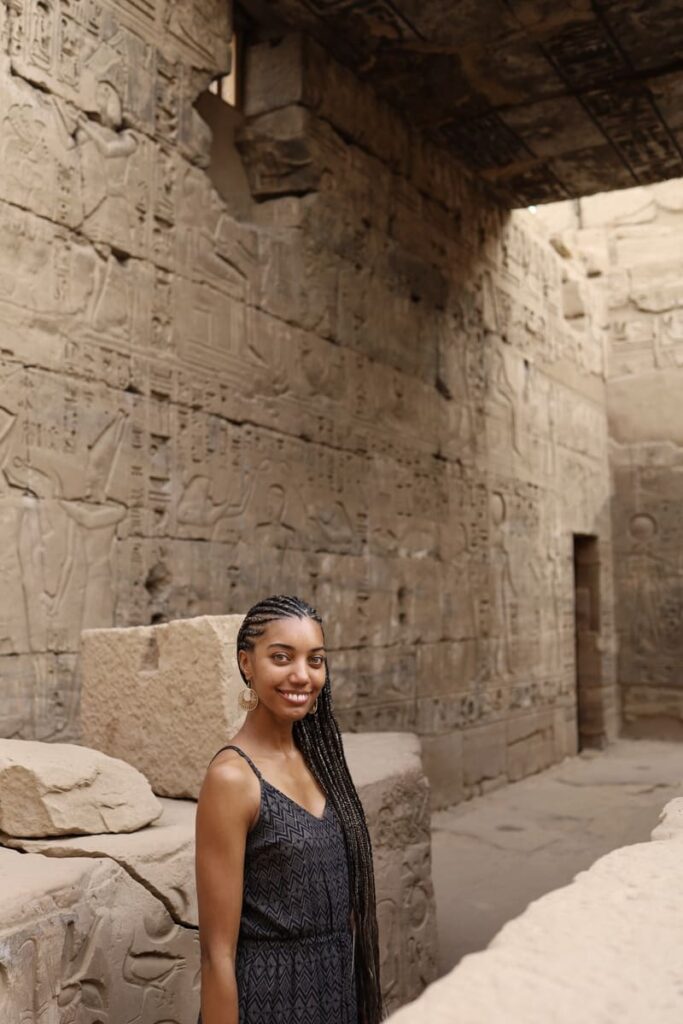
Travel Insurance
We highly recommend getting travel insurance for Egypt. We personally use SafetyWing for all our international trips.
SafetyWing Travel Medical Insurance is affordable and covers unexpected emergencies, including medical issues, travel delays, and theft.
12. What to Pack for Egypt
Travel Essentials
- Toilet Paper & Hand Sanitizer: Public restrooms may not provide toilet paper, and soap is hit-or-miss, so always carry your own.
- Hat, Sunscreen & Bug Spray: The Egyptian sun is intense, and you’ll be outdoors a lot. Protect your skin and avoid bug bites, especially if you’re visiting areas near the Nile.
- Water & Snacks: Staying hydrated is key, especially in the desert heat. Pack bottled water and some snacks (granola bars, nuts) for long travel days.
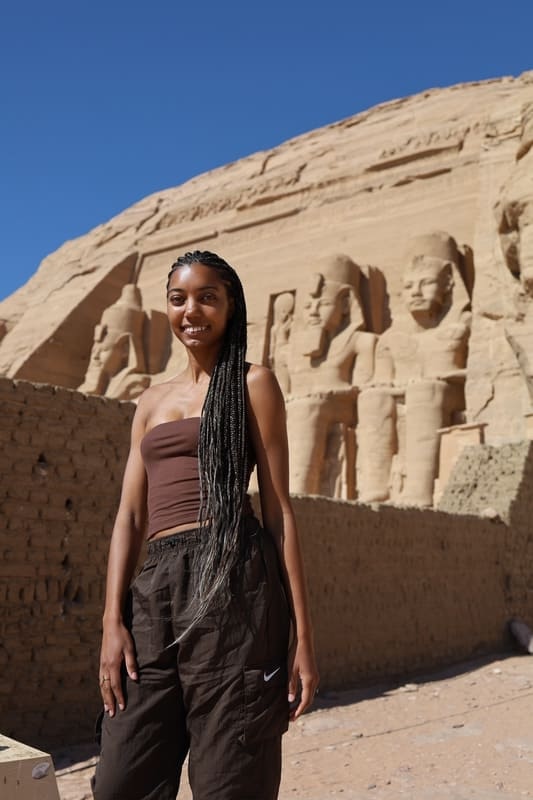
Clothing Tips
- Light, Breathable Outfits: Pack cotton or linen clothing to stay cool. Loose, airy outfits are best for the heat.
- Respectful Attire: While Egypt isn’t super conservative, it’s still best to dress modestly. Skip short skirts and revealing outfits unless you’re at a beach destination.
- Swimsuit: If you’re heading to beach towns like Hurghada or Sharm El Sheikh, definitely bring swimwear. Your resort in Luxor or other areas may also have a pool, so pack a swimsuit depending on your accommodation.
Money Tips
- Small Bills in Different Bags: Vendors often claim they have no change, so carry small bills in different pockets or bags. This also makes it easier to pretend you’re out of cash if you’re being pressured to buy something.
- Cash Over Cards: Many markets and small shops are cash-only, so carry plenty of small denominations.
- Cards with No Foreign Transaction Fees: Many tourist attractions do not accept cash and are cash only. Be sure to bring a card that doesn’t charge you extra for foreign transactions.
Hygiene Tip
- Extra Toothbrush: Only brush your teeth with bottled water. If you accidentally use tap water, throw out your toothbrush and use a backup one.
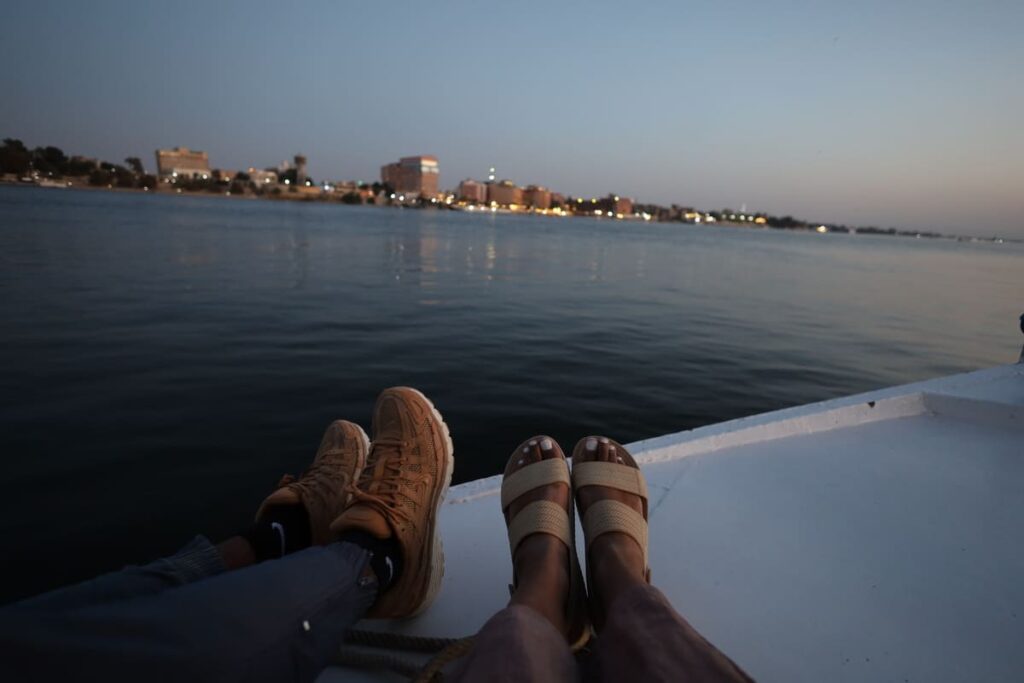
RELATED ARTICLE: What Is the Most Beautiful Beach in La Digue?
FAQs: Tips for Visiting Egypt
What do you need to know before traveling to Egypt?: Get a visa on arrival ($25 USD cash) and always carry small bills for tips.
What is not allowed to bring to Egypt?: Drones are banned.
Should you rent a car in Egypt?: No. Traffic is chaotic—use Uber, taxis or hire drivers instead.
Should you travel with an Egyptologist?: It could be a good idea. They can offer expert insights and help you avoid scams.
Is Egypt safe?: Yes, but be cautious. Expect persistent vendors and petty scams.
What are the unspoken rules in Egypt?: Tip often, dress modestly, and negotiate prices firmly.
What is the travel etiquette for Egypt?: Respect religious sites by covering up, removing shoes, and avoiding flash photography.
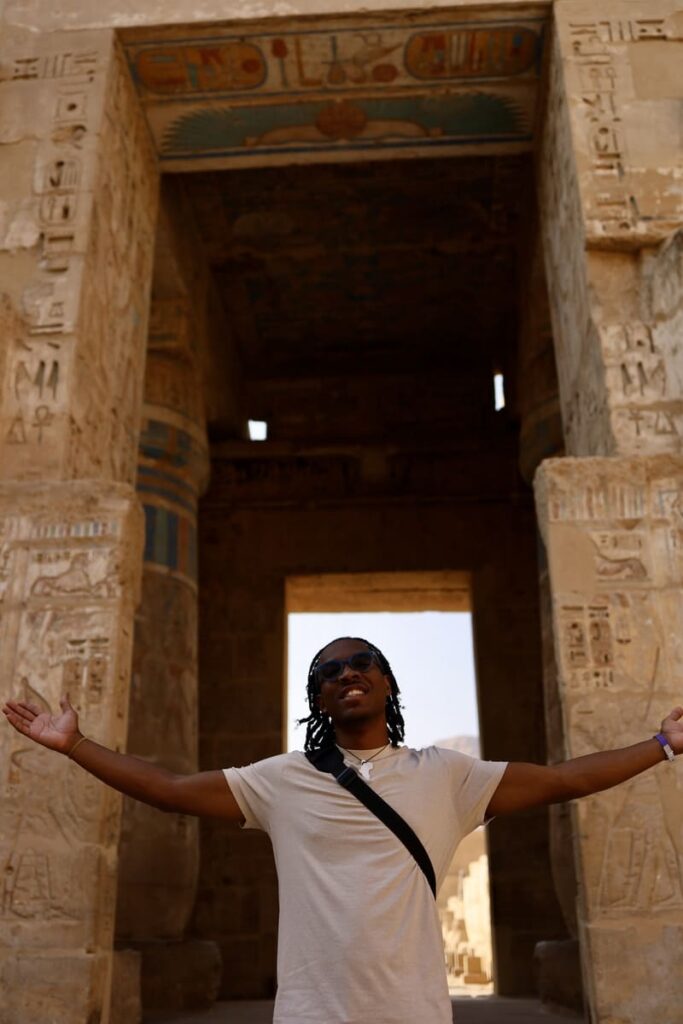
Final Egypt Tips
Egypt’s wonders are worth the visit, but go prepared.
By knowing what to expect, you can focus on enjoying the pyramids, temples, and rich history—while dodging the hassles.
Ready to plan your trip to Egypt? Check out our other helpful articles:
- Is Luxor, Egypt Worth Visiting?
- Do’s and Don’ts in Cairo Egypt
- What is the Nubian Village Famous For?
- What is the Best Itinerary for Egypt?
Found this article helpful? Share it!


